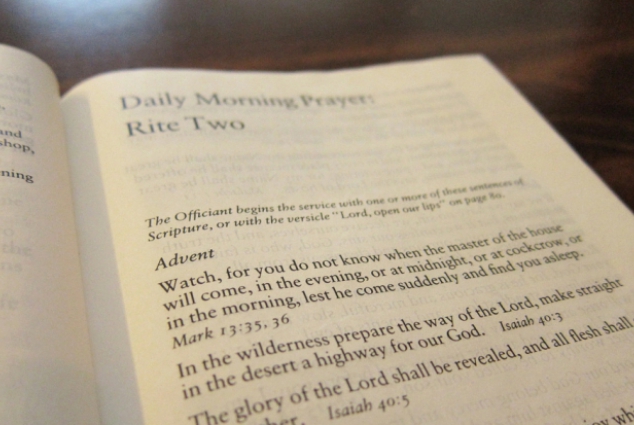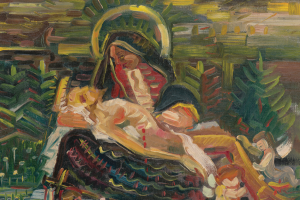Ever since I first learned the Hail Mary, I have loved prayer. Perhaps Sister taught us the Glory Be first. It’s shorter, more repetitious; if you know the sign of the cross, you’re halfway there. But it’s the Hail Mary I remember, specifically the pleasure of the word amongst. It was the mystical heart of the prayer for me—at least when I was six. I also loved the hallowed in the Our Father, and that ignominious lurked somewhere among the stations of the cross.
I loved the heightened language of prayer. As I grew older and my prayer matured, I loved the place to which the heightened language brought me, a place where I felt transfigured, fed, guided, and brought closer to God. I’ve stayed, with greater or lesser success, as close as possible to this place throughout my life. I’ve filled a timeless space with my life story. I have a history in prayer.
For over 30 years, I’ve prayed the daily office in the Book of Common Prayer used in the Church of England (the Episcopal Church here in the United States). One of the nice things about the Church of England is that it knows good English when it hears it, and I love the cool, solid voice of Episcopal prayer. I need God’s mercy, but I also need God’s elegance.
In the 1980s, when I bought my first copy of the prayer book at a New York City Catholic bookstore in the Village, I was initially drawn to its quiet, Protestant good taste: an unassuming volume with a cover of fine-grain black leather, gilt page edges, and three sturdy black ribbons.
It was love at first sight . . . and smell. That firm, clean smell of fresh leather would, I thought, be like praying inside a new car.
Time has taken its toll. I noticed a few weeks ago that decades of my thumb and forefinger turning the pages and depositing grains of New York grime has colored them mustard yellow at the lower edges and corners. There are random stains, including a partial fingerprint made in coffee. The bottom edges are so frayed and tattered, they seem more pirate map than prayer book.
I decided I should retire it before it dissolved in my hand, so I went to the publisher’s website and ordered a nearly exact replica. But before I put the old one on the shelf, I wanted to have one more walk through it. I wondered if there were pages that said something about me, hinting at who I was and what I was doing as I moved among them day after day. Would the stains and fingerprints, the ragged edges, the creased pages, the torn ones reveal a spiritual history, an archeology of my prayer?
The pages—once crisp, translucent onion skin—have faded to pale ivory and now seem nearly damp to the touch. The gilded edges struggle on to little avail. Held in the light, they still manage a faint shimmer, but it’s the luster of a bottle blonde. And while the leather smell is long gone, there simmers now among the pages something a little musty and sweet. When I dig my nose right in, I am transported for a moment back to my grandmother’s house: There is a mantle clock ticking on the sideboard. There are the African violets.
One of the most distressed sections of the book is the Psalter. The pages of some of my favorite Psalms—2 (where God laughs), 45 (so writerly), and 139 (all about cosmic transparence)—bear wrinkles largely absent from their neighbors. And I seem to have accidentally dog-eared Psalm 22, the psalm Jesus prayed on the cross: “My God, my God, why have you forsaken me?” There’s a strange pinch in the paper at Psalm 74, a rippled crimp near the top of the page, as if I’d been gripping it too tightly. It’s an affliction psalm that starts off “O God, why have you utterly cast us off?” and pretty much goes downhill from there. There’s a pretty bit toward the middle (“Yours is the day, yours also the night; you established the moon and the sun.”), but you have to slog through a lot of misery to get to it: defiled holy places, innumerable adversaries, not a prophet to be seen. Toward the end, in the don’t-just-sit-there-do-something section, the psalmist makes a rather pointed reference to the covenant, and in case that doesn’t work, he reminds God that “fools revile you all day long.” The marvelous thing about Psalms, of course, is the book’s wide emotional range, which makes it the most human book in the Bible. There is, they say, a psalm for every mood. And by God’s grace I’m very rarely in the mood corresponding to Psalm 74.
But clearly there was a time when I was in a mood that had me gripping the page. I wondered if Psalm 74 was part of the cycle during the year and a half I was unemployed during the recession—easily the most frightening, most alienated, most unhinged time of my life. Prayer in general, and the office in particular, took on a deeper resonance. In prayer I could remember the things I was grateful for: the love and support of my friends and family, sustained hope, and a greater sense of God’s presence in a life that was slowly hollowing out. Prayer was also the place where I could allow myself to be as frightened as I really was. (I’ve always loved the agony in the garden because Jesus is so human in it, so afraid.) And the office gave my day markers: signposts in the abyss of time that stretched before me every morning, buoys in the stream of anxiety that carried me through the day, an undercurrent running even beneath my prayer. Small wonder there was a crease by Christ’s last words on the cross.
But I was gripping Psalm 74. There was a folding and clenching going on inside me at the time, too, a caving in. Something in me was cowering in the face of life because it was simply too empty and painful.
There are no creases and no stains on the pages containing Psalms 113, 114, and the first chunk of 115. But toward the bottom, tucked into the fold where the two pages meet, I noticed a small eyelash, the tips of its curve pointing to the first line of 114: “Hallelujah! When Israel came out of Egypt . . . ” I’m old enough that I imagine random bits of me fall off with some regularity, but still I wondered how the eyelash landed on this page. Maybe I was rubbing my eye. (If the psalm was part of evening prayer, I’d have just gotten home from the office; my eyes would be tired.) Maybe I closed my eyes in prayer and it fell out. Maybe I was crying.
And there are certainly weep-worthy moments in these psalms—at least in 113 and 114 (115 is pretty much a you’re-so-much-better-than-an-idol psalm). Psalm 113 is a wonderful ode to God’s power and kindness: five verses that fairly rattle in praise of his majesty, and then three tender couplets about how much he loves the lowly. The final verse is “He makes the woman of a childless house to be a joyful mother of children,” and just about every time I read it, I get tears in my eyes. And when you have a sense of your own redemption, you’re ready for Psalm 114: pure, earth-shattering praise and the delirium of newfound freedom—with a catch. The follow-up to the opening “Hallelujah! When Israel came out of Egypt …” is “Judah became God’s sanctuary/and Israel his dominion.” In other words, we were freed, but we were also claimed. We’re God’s now. Our freedom is the freedom of God, the freedom to be holy. For four verses, faced with God’s liberating presence, the earth itself trembles. Mountains leap, the sea withdraws, rivers change their course. It’s at the final verse, praising the God “who turned the hard rock into a pool of water/and flint-stone into a flowing spring” that my own waterworks begin. It’s when the psalm moves to the desert, to the hard rock at the heart of me, and recounts how God, whose mercy is even more dizzying than his freedom, turned it to a pool of water, a flowing spring, that my joy and gratitude bring me to tears.
There’s a tiny rip near the bottom of one of the pages in evening prayer, and I think it’s there because I was in such a hurry to get to the prayer on that page, one of my favorites: O Gracious Light, or, in the original Greek, Phos hilaron, a Christian hymn going back to at least the third century. Phos is “light”; and hilaron is a marvelously flexible little adjective. “Gracious light” can also be “cheerful light,” “joyous light,” “gentle light” and, my favorite, “gladsome light.” (“Giddy” would work, too.) Whatever it is, it’s to be said by someone smiling and a little stunned in the sunset glow of vespers.
I live across the street from The Cloisters museum, an extraordinary collection of medieval art on the northern end of Manhattan. I ran over there on an impulse late one November afternoon—a touch of cabin fever, but I also needed to pray—and headed for the stained glass gallery. The room faces west, and the setting sun was pushing a glowing red-gold through the pieces of glass, the fragments of angels, the Virgins. Golden rose tones were easing through the yellows and blues and rubies, turning the room soft and mystical with color. People tend to whisper at The Cloisters, but suddenly no one was saying anything at all. It had all become too beautiful. I stood before my favorite window (one that, for some reason, I consider Cistercian), and prayed the Phos hilaron: “O gracious Light, pure brightness of the everliving Father in heaven, O Jesus Christ, holy and blessed …”
Phos hilaron is one of the oldest hymns in the church and the first to approach our own sense of what a hymn should be. It’s rhythmic; it has verses. St. Basil wrote about it in the fourth century—and even then, he says, it was very, very old. He tells of a ritual at the tomb of Christ in Jerusalem, where there was a lamp kept perpetually lit. Christians would gather to pray at the tomb, and at the end of their prayer they would sing Phos hilaron. Then a single candle would be lit from the lamp and carried out of the tomb into the world: the light of the resurrection. So, often as I say this prayer, I’ll picture myself in the tomb, an image heavily influenced by John’s description of it in his Easter account (the “face cloth rolled up in a place by itself” is just in the corner of my eye as I pray), and feel its cool silence wrap around me as I praise the Living Word: “You are worthy at all times to be praised by happy voices/O Son of God, O Giver of life/and to be glorified through all worlds.”
I like that evening prayer should begin with a few moments at the very heart of Christian mystery, at the source and goal of all prayer. I like to be reminded that I’m still waiting in the empty tomb, wanting an angel to tell me what happened, wanting to carry that strange, gracious light into the world.
And tonight, although I’ve been using the new prayer book for several weeks now, it finally became mine. As I turned a page during evening prayer, I inadvertently bent it slightly. Then, smoothing it out, I noticed a tiny clump of something (from my fingernail?) lodged near the gilding. At first I tried to pick it off, but then smiled and let it be. Another life of prayer had begun.
This article appears in the March 2016 issue of U.S. Catholic (Vol. 81, No. 3, pages 29–31).
Image: Flickr cc via Bryan Sherwood













Add comment